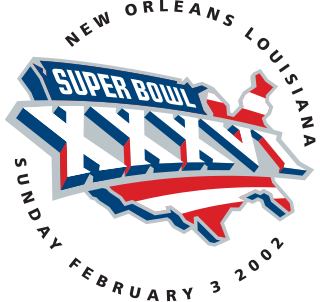
Super Bowl XXXIV was an American football game played at the Georgia Dome in Atlanta on January 30, 2000, to determine the National Football League (NFL) champion for the 1999 season. The National Football Conference (NFC) champion St. Louis Rams defeated the American Football Conference (AFC) champion Tennessee Titans 23–16, to claim their first Super Bowl win and first NFL championship since 1951. To date, it is the most recent NFL championship game in which both teams were seeking their first Super Bowl title.

Super Bowl XXXVI was an American football game between the National Football Conference (NFC) champion St. Louis Rams and the American Football Conference (AFC) champion New England Patriots to decide the National Football League (NFL) champion for the 2001 season. The Patriots defeated the Rams by the score of 20–17. It was New England's first Super Bowl championship, and the franchise's first league championship of any kind. The game was also notable for snapping the AFC East's long streak of not being able to win a Super Bowl championship, as the division's teams had lost eight Super Bowls in total with the last win being the Miami Dolphins in 1974. This was the last Super Bowl to feature the St. Louis Rams; after relocating to Los Angeles in 2016, the Rams returned to the NFL's championship game in Super Bowl LIII, in which they were again defeated by the Patriots. The Rams returned three years later in Super Bowl LVI, in which they beat the Cincinnati Bengals by a score of 23–20.
The National Football League playoffs for the 2004 season began on January 8, 2005. The postseason tournament concluded with the New England Patriots defeating the Philadelphia Eagles in Super Bowl XXXIX, 24–21, on February 6, at Alltel Stadium in Jacksonville, Florida.
The National Football League playoffs for the 2003 season began on January 3, 2004. The postseason tournament concluded with the New England Patriots defeating the Carolina Panthers in Super Bowl XXXVIII, 32–29, on February 1, at Reliant Stadium in Houston, Texas.
The National Football League playoffs for the 2001 season began on January 12, 2002. The postseason tournament concluded with the New England Patriots defeating the St. Louis Rams in Super Bowl XXXVI, 20–17, on February 3, at the Louisiana Superdome in New Orleans, Louisiana.
The National Football League playoffs for the 2000 season began on December 30, 2000. The postseason tournament concluded with the Baltimore Ravens defeating the New York Giants in Super Bowl XXXV, 34–7, on January 28, 2001, at Raymond James Stadium in Tampa, Florida.
The National Football League playoffs for the 1999 season began on January 8, 2000. The postseason tournament concluded with the St. Louis Rams defeating the Tennessee Titans in Super Bowl XXXIV, 23–16, on January 30, at the Georgia Dome in Atlanta.

Kevin Troy Faulk is a former American football running back who played in the National Football League (NFL) for 13 seasons with the New England Patriots. He played college football at LSU, where he received first-team All-American honors, and was selected in the second round of the 1999 NFL Draft by the Patriots. Faulk held a variety of offensive and special teams roles during his career and contributed to the franchise's first three Super Bowl titles. For his accomplishments in New England, he was inducted to the Patriots Hall of Fame in 2016. After retiring from the NFL, Faulk returned to LSU as a coach from 2018 to 2021. He was inducted to the College Football Hall of Fame in 2022.

The National Football League playoffs for the 1985 season began on December 28, 1985. The postseason tournament concluded with the Chicago Bears defeating the New England Patriots in Super Bowl XX, 46–10, on January 26, 1986, at the Louisiana Superdome in New Orleans, Louisiana.
"The Greatest Show on Turf" was a nickname for the record-breaking offense of the St. Louis Rams during the 1999, 2000, and 2001 National Football League seasons. The offense was designed by attack-oriented offensive coordinator and head coach Mike Martz, who mixed an aerial attack and a run offense in an Air Coryell-style offense. The Rams' offense during these three seasons produced record scoring and yardage, three NFL MVP honors, and two Super Bowl appearances and one championship. In 2000, the team set an NFL record with 7,335 total offensive yards. Of those, 5,492 were passing yards, also an NFL team record.
The Minnesota Vikings is an American football franchise based in Minneapolis. The team was established in 1961 and is part of the National Football League's NFC North division. Since then, the team has taken part in the NFL playoffs 30 times, reaching four Super Bowls in 1970, 1974, 1975 and 1977.
The 2003 season was the St. Louis Rams' 66th in the National Football League, their ninth season in St. Louis and their fourth under head coach Mike Martz. The Rams were coming off a disappointing 7–9 season and former MVP Kurt Warner was demoted to backup quarterback; Marc Bulger earned the starting job after replacing Warner in 2002 and winning six of his seven starts. Though many agree that The Greatest Show on Turf ended after the 2001 season, the Rams nonetheless finished 12–4, winning the NFC West, only to lose to the eventual NFC champions Carolina Panthers. This would be the last time the Rams won the NFC West until the 2017 NFL season.
The 2001 season was the St. Louis Rams' 65th in the National Football League, their seventh in St. Louis and their second under head coach Mike Martz. The Rams improved on their 10-6 record from last year, and finished 14-2. In going 14-2, the Rams finished in first place in the NFC West, and first place in the whole NFL. The St. Louis Rams in 2001 set a franchise record for wins in a season (14), while also going a perfect 8–0 on the road. Quarterback Kurt Warner would go on to win his second league MVP award. Along with Warner's 1999 MVP award and Marshall Faulk's 2000 award, the Rams had amassed the last three NFL MVP awards.
The 2000 season was the St. Louis Rams' 63rd in the National Football League (NFL) and their sixth in St. Louis. For the first time in franchise history, the Rams entered the season as the defending Super Bowl champions. The Rams finished the regular-season with a record of 10–6 but would go on to lose to the New Orleans Saints in the Wild Card round of the playoffs. They led the NFL in scoring for a second straight year with 540 points. The Rams became the first team in NFL history to score more than 500 points on offense, while allowing more than 450 points on defense.

The 1999 St. Louis Rams season was the team's 62nd year with the National Football League and the fifth season in St. Louis, Missouri. The Rams finished the regular-season with a record of 13–3, and defeated the Tennessee Titans in Super Bowl XXXIV.

The 1985 Los Angeles Rams season was the franchise's 48th season in the National Football League and their 40th in the Greater Los Angeles Area.
This article details statistics relating to the Houston Texans American football team.